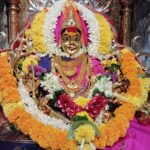Anupama Nair
www.mediaeyenews.com
Our great Prime Minister Modi inaugurated the Amrit Mahotsav or celebration of India’s 75th year of Independence. We will be celebrating this event till 2022. I am going to write a feature on all those great men and women who fought against foreign invasion not just against the British. Today I am going to write about the mother-daughter duo, who defeated Ghori and Aibak. Have you heard this story before? I am sure the answer would be no, as our history in textbooks was written mostly by people who were not patriots. There are many dynasties who ruled for centuries, but few invaders who ruled for lesser years got more coverage in our curriculum. Many warriors, especially brave queens were neglected and never included in history. One such brave queen is Nayaki Devi, the queen of Gujarat who defeated Muhammad of Ghori 14 years before he faced Prithvi Raj Chauhan and her daughter Kurma Devi, who defeated Aibak.
Kurma Devi was the brave daughter of a braver mother. She was a witness to her mother defeating the cruel invader Ghori. She was married to Samar Singh, the Rawal of Chittorgarh, who had two wives. His first wife was Prithabai who was the sister of one of India’s greatest sons – Prithvi Raj Chauhan and the other wife was Kurma Devi. Prithvi Raj Chauhan fought Muhammad Ghori, and was martyred, but killed Ghori too.
There is falsehood women were not treated well in Bharat, it may be true in the modern world, but in the ancient period, women were equal to men and treated well. Women were well versed in archery and known for their bravery. Think about the great daughters of this land. I had written a series of articles about the great queens of India. We were anything but regressive!
Unfortunately, Samar Singh and his eldest son were killed in the Second Battle Of Tarain (1191-92 AD) that was fought between Prithvi Raj Chauhan and Muhammad Ghori. After the war, Ghori returned to Multan and left Qutub-ud-din Aibak in charge of Delhi. Now let us talk about Quṭub-ud-Dīn Aibak who was the founder of the Mamluk dynasty and the first sultan of the Delhi Sultanate. He was born in Turkistan and was a slave. When his master died, he was sold by his master’s son to Muhammad of Ghor, who made him the Amir-i-Akhur (Master of Slaves). Over the years, he joined Ghori’s military and rose to become the general of Muhammad of Ghor.
Kurma Devi had to look after her young son Karan Singh. After a couple of years, Kurma Devi led her army with nine other kings and eleven Rawat's, in her march towards Delhi to seek revenge against the man who had killed her husband and kill him — Qutub-ud-Din Aibak. Kurma Devi and her army encountered Qutub-ud-Din Aibak and his army near the old Amber Fort. She herself confronted Aibak and challenged him in a duel. What a brave woman to challenge a sultan! In the duel, this brave queen managed to bury her sword deep into Qutub-ud-Din’s flesh, and he was so severely wounded that he tumbled from his horse. Aibak’s army believed he was dead, and the cowards that they were, instead of fighting back they fled from the battlefield. Kurma Devi thought that she had avenged the death of her dead husband with the death of Qutub-ud-din and she returned to Chittorgarh.
But unfortunately, Aibak was not dead. He recovered and decided to take vengeance. He declared himself the Sultan of India. He destroyed the temple of Vishnu, which also had Vishnu Dhwaj. (later named as Qutub Minar in Delhi). He attacked Mewar and captured Karan Singh. He looted all the wealth of Mewar and also took Karan Singh as a captive and his loyal horse Shubhrak. When they reached Lahore, Karan Singh tried to escape but unfortunately, he was caught. In anger, Qutub-ud-din ordered to behead Karan Singh. He declared that he would play a polo match with the dead king’s head. The next day, Qutub-ud-din arrived at the venue, riding on Shubhrak. But as they say you pay for your evil deeds and now that is what happened.
Animals of India are very intelligent and loyal to their masters, whether it is our horses, elephants or cows. Shubhrak immediately recognized his master Karan Singh and started crying. When he saw that his master was released from his chains so that he could be beheaded, Shubhrak suddenly became uncontrollable and threw Qutub-ud-din on the ground. Next, Shubhrak stomped on Aibak’s chest and head with his mighty hooves continuously. Hit by such powerful hooves, Qutub-ud-din died on the spot. But this was not it. Before the army could capture it, Shubhrak ran towards his master Karan Singh and saved his life. Karan Singh mounted the horse and escaped and Shubhrak ran for several days and nights till it reached the palace of Udaipur. There, Karan Singh got down, and patted his beloved horse … but after acknowledging the pat from its master, Shubhrak fell to the ground and died.
When I think of such valiant souls, I bow my head with reverence to those who had protected India and our Dharma from avaricious hordes of invaders. Now think about what you were taught in history books and what was the reality? Isn’t it the time we rewrite our history books and invaders shown in their true colors and our cities and streets named as they were before these invaders whose only intention was to loot the “sone ki chidiya” and not work for the benefit of the country? Hope the time comes soon! I for sure would like to see that in my lifetime. Vande Mataram!

































Great research work done by Anupama. Still can’t understand why we glorify invaders?
Great article.
Great article.
Great work done.
Great work done.
Wow. the article is well written.
Wow. the article is well written.
Wow. the article is well written.
Great article
Great article
Unknown queens of India.
Unknown queens of India.
Great article
Reality of Indian braved queen
Great thanks to you, to Share a GREAT story.